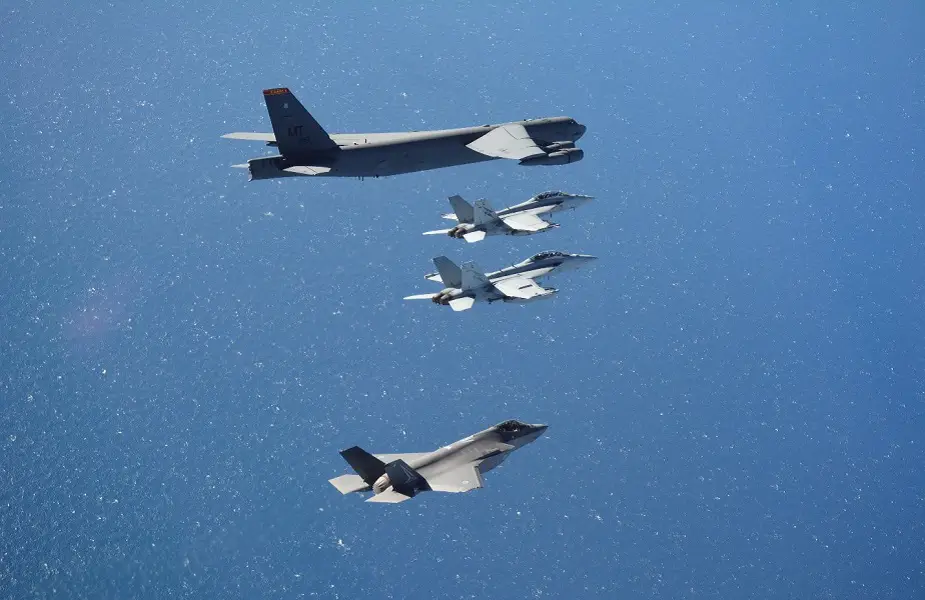Breaking news
Lockheed Martin supports US Indo Pacific Command in bilateral exercise with Australia.
The Lockheed Martin (LMT) F-35 Lightning II and Virtual Aegis Weapon System (VAWS) demonstrated the ability to share real-time sensor data from Fort Worth, Texas, to Honolulu, Hawaii, and on to the Australian Defence Force during a recent military exercise between the United States and Australia.
Follow Air Recognition on Google News at this link
 A Royal Australian Air Force EA-18G Growler, F/A-18F Super Hornet and F-35A Lightning II fly alongside a United States Air Force B-52 Stratofortress aircraft during Exercise Talisman Sabre 2021 (Picture source:SGT Andrew Eddie 464SQN AFID-AMB)
A Royal Australian Air Force EA-18G Growler, F/A-18F Super Hornet and F-35A Lightning II fly alongside a United States Air Force B-52 Stratofortress aircraft during Exercise Talisman Sabre 2021 (Picture source:SGT Andrew Eddie 464SQN AFID-AMB)
In partnership with U.S. Indo Pacific Command, Lockheed Martin’s participation in Talisman Sabre 2021 (TS21) continued the military/industry team’s experimentation efforts to improve joint interoperability between U.S. services and allies.
The exchange of real-time F-35 data with non-F-35 platforms outside of the United States via the F-35’s multi-function advanced data link directly supports goals presented in the Pacific Deterrence Initiative. This initiative includes using large-scale exercises to pursue innovative experimentation in support of building joint all-domain information sharing capabilities.
“With this demonstration, the F-35 has proven that its sensor fusion capabilities make it the most advanced node in the 21st century warfare network-centric architecture,” said Bridget Lauderdale, Lockheed Martin vice president and general manager of the F-35 program. “We are proud to deliver on the expectations of our customers in the Indo-Pacific Command theater and in Australia and look forward to working with them to build on the capabilities the F-35 has proven thus far.”
In the 21st century battlespace, dominance will be determined by the ability to securely connect high-tech platforms into one cohesive network that spans every domain – air, land, sea, space and cyber. This recent demonstration strengthens the U.S. military’s interoperability with its allies against the heightened strategic threat environment. Only the F-35 has the ability to reach into austere environments to provide critical real-time information back to allied defense forces.
Starting with Talisman Sabre in 2019, Lockheed Martin has collaborated with U.S. Indo-Pacific Command on experimentation to enhance kill webs, which are a multitude of sensors that collect, prioritize, process, and share data, then fuse it into a continuously updated display of information for joint forces. The demonstrations conducted during TS21 are further proof of Lockheed Martin’s ability to quickly connect advanced technology, provide commanders more options to meet their objectives, and ensure warfighters have the information needed to quickly make critical decisions in the battlespace.
To date, the F-35 operates from 21 bases worldwide, with nine nations operating F-35s on their home soil. There are more than 670 F-35s in service today, with more than 1,440 pilots and 10,850 maintainers trained on the aircraft. The Aegis Weapon System’s versatility is reflected in afloat, ashore, expeditionary and virtual operations, with seven nations utilizing Aegis’ proven multi-mission capability.

























